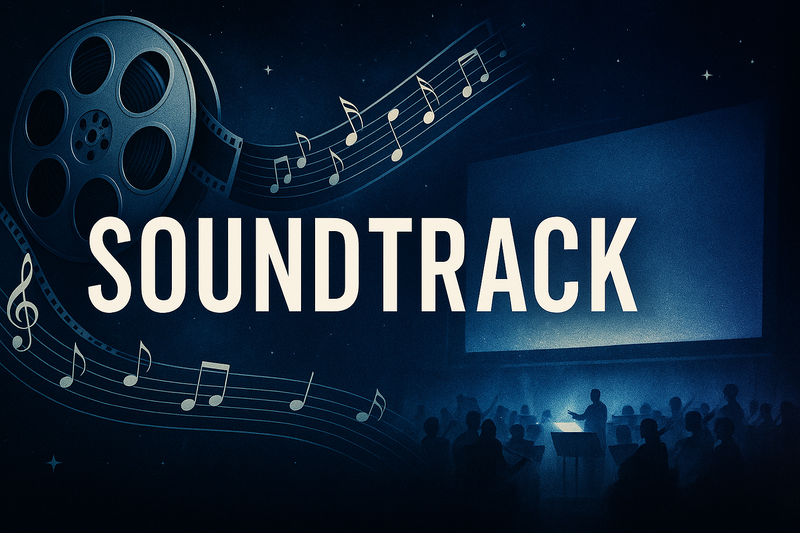Episode at a Glance
From the first silent films with live piano accompaniment to John Williams’ galaxies, Hans Zimmer’s thunder, and curated mixtapes in Guardians of the Galaxy — soundtracks are the unseen storytellers of cinema. They terrify us with two notes (Jaws), make us weep with a violin (Schindler’s List), and turn pop songs into generational anthems (The Bodyguard, Dirty Dancing, Frozen). This episode explores how soundtracks became not just background, but the pulse of collective memory, culture, and identity.
The Hosts
Daniel: Rock and metal devotee, fascinated by hidden stories behind riffs, scores, and soundscapes.
Annabelle: Drawn to pop, soul, and Latin grooves — for her, music is memory, community, and emotion.
Setting & Zeitgeist
- Silent era: Pianists improvising moods for flickering screens.
- Golden Age Hollywood: Max Steiner, Korngold, Newman — symphonic lushness shaping epic narratives.
- 1960s–70s experiments: Herrmann’s Psycho strings, Morricone’s desert whistling, Kubrick’s use of classical and electronic sound.
- Blockbuster revival: Williams (Star Wars, E.T.), Horner (Titanic), Elfman (Batman), Zimmer (Gladiator, Inception).
- Pop soundtrack boom: Saturday Night Fever, Dirty Dancing, The Bodyguard, Disney musicals, MTV and radio synergy.
- Streaming & global era: Marvel’s Black Panther, Netflix’s Stranger Things, anime and gaming scores going mainstream.
The Sound of Soundtracks
- Film scores: Original compositions — Williams, Morricone, Zimmer, Shore, Desplat.
- Needle drops: Carefully curated songs — Tarantino, Coppola, Scorsese.
- Songs as lifelines: Whitney’s I Will Always Love You, Celine’s My Heart Will Go On, Idina Menzel’s Let It Go, Eminem’s Lose Yourself.
- Cultural codes: Rocky steps, Titanic’s bow, Friends clapping, Stranger Things synths.
Suggested Listening
- Max Steiner — King Kong (1933), Casablanca (1942)
- Bernard Herrmann — Psycho (1960), Vertigo (1958)
- Ennio Morricone — The Good, the Bad and the Ugly (1966), The Mission (1986)
- John Williams — Star Wars (1977), Jurassic Park (1993), Harry Potter (2001)
- Hans Zimmer — Gladiator (2000), Inception (2010), Interstellar (2014)
- James Horner — Titanic (1997)
- Howard Shore — The Lord of the Rings (2001–03)
- Whitney Houston — I Will Always Love You (The Bodyguard, 1992)
- Celine Dion — My Heart Will Go On (Titanic, 1997)
- Idina Menzel — Let It Go (Frozen, 2013)
- Eminem — Lose Yourself (8 Mile, 2002)
- Guardians of the Galaxy: Awesome Mix Vol. 1 (2014)
Core Ideas in This Episode
- Soundtracks as storytellers: Music shapes memory, fear, love, and protest as much as dialogue or camera.
- Cultural immortality: Great soundtracks outlive films, becoming anthems, memes, rituals, and symbols.
- Global voices: Bollywood, anime, K-pop, Nollywood — the soundtrack is now global.
- Future trends: Streaming, fan culture, video games, AI, and hybridization are reshaping the next era of soundtrack music.
Takeaway
Soundtracks are not just background — they are the heartbeat of cinema and life. They turn films into myths, scenes into rituals, and melodies into cultural DNA. From silent theaters to Spotify playlists, from Morricone’s deserts to Beyoncé’s empowerment anthems, soundtracks prove that music is cinema’s most universal language — and the soundtrack of our own lives.
